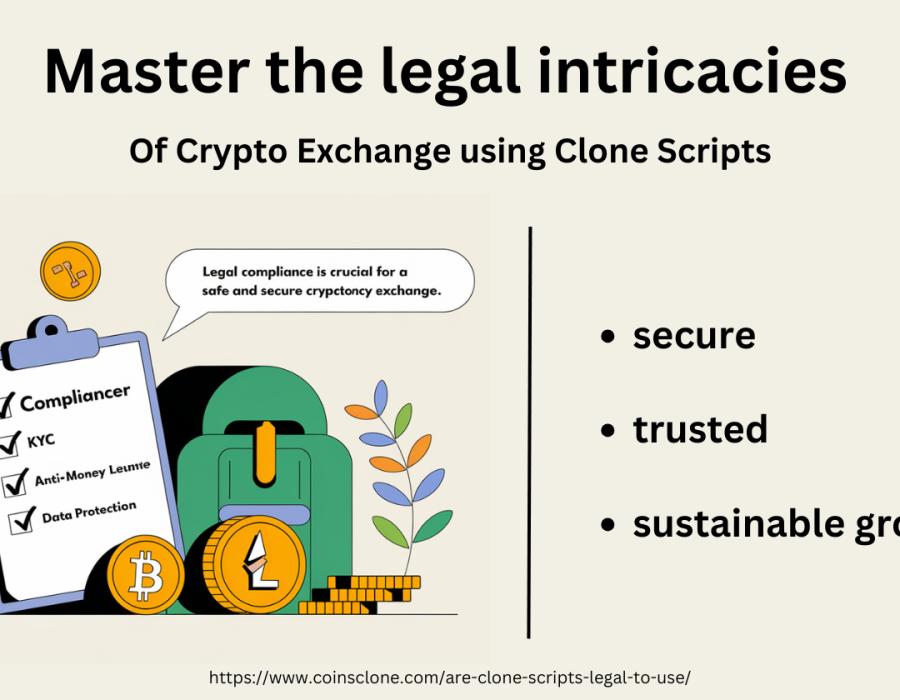Using a clone script to establish a crypto exchange is one of the preferred options for many start-ups interested in investing in the promising sphere of cryptocurrencies. Clone scripts are available and include ready templates that can be worked on to ensure that they suit a specific business requirement, making them efficient and cost-effective. However, some challenges are associated with this while the adoptability of the developed models is still a strength, even then, another important process that cannot be overlooked is legal compliance. This post is part of the Microblog series and will discuss why legal compliance should be pursued, how it can be done, and what you can do to maintain compliance for your Crypto Exchange.
Why Legal Compliance Matters
Compliance is no longer a compliance tick box exercise but is essential for any exchange and the owner of such platforms to gain the confidence of people. Crypto regulations vary across jurisdictions and typically govern areas such as:
- Licensing: Acquiring all the permissions required to operate as a legal business.
- AML (Anti-Money Laundering) Laws: There will be no compromising of the platform that you are supporting to allow for financial malfeasance.
- KYC (Know Your Customer) Policies: To curb fraud cases and safeguard individual accounts the identity of the users has to be affirmed.
- Data Protection: Protection of the user information from breaches.
Failure to respond to all of these requirements can result in harsh penalties, operational bans, or a loss of user trust.
A Methodology on How Legal Compliance Can Be Obtained
Achieving legal compliance while developing a crypto exchange using a clone script involves several key steps:
Discover Regional Rules And Regulations
There are as many crypto laws as countries with a different approach to legal regulation. For instance, some countries such as the United States have corporate licensing and AML compliances that are very rigid as compared to those of other countries. Still, it is important to find the specific regulations in the particular regions of its future operation.
Customize Your Clone Script
Clone scripts can easily adapt to changes in legal demands since they save initial effort. Engage competent coders and lawyers to incorporate compliance aspects like KYC processes, transaction monitoring tools, and secure wallet mechanisms.
Conduct Regular Audits
Regular assessment, by legal and technical professionals, will most often reveal significant risks or non-compliance. This keeps one on the safe side going forward to mitigate any legal suits after launching the product.
Address Intellectual Property Concerns
Be very careful to ensure that the clone script you intend to use is bought from a genuine source. Make sure that the script is not violating some copyright or proprietary right, as the usage of unverified scripts may result in someone's lawsuit or banning.
Partner with Legal Experts
Engage lawyers with expertise in this emerging legal practice area to ensure first-rate service delivery. They can advise you to navigate through this legal jungle, as well as help you acquire the needed permits and not violate any laws.
The advantages of maintaining legal compliance are
Enhanced User Trust
The legally correct platform also shows the judiciary acceptance and this in turn increases the rate of customers for your exchange.
Operational Stability
Compliance means that there are no legal pitfalls that can cause your platform to shut down, thus enabling continued functionality.
MEOs are opportunities for expansion in foreign markets.
Meets the legal requirements, which allows for legal entry into multiple regions without many restrictions thus expanding your market share and the size of your potential revenue.
Long-Term Growth
Legal compliance helps to clear the path from possible lawsuits and fines, which will help bring Crypto to the right development and credibility.
Conclusion
With clone scripts, there is a method of developing effective and cheap cryptocurrency exchange platforms, but their establishment depends on legal issues. This includes meeting regional regulations such as protecting IP and each segment of your platform needs to be reviewed to ensure nothing falls foul of the law. Moreso, given sufficient legal dynamism one can establish a platform that not only sustains itself but also grows as well as attaining credibility among the users within the rampant crypto markets.
For an in-depth understanding of clone script legalities, read our blog: "Are Clone Scripts Legal or Illegal? – A Detailed Explanation."





Comments